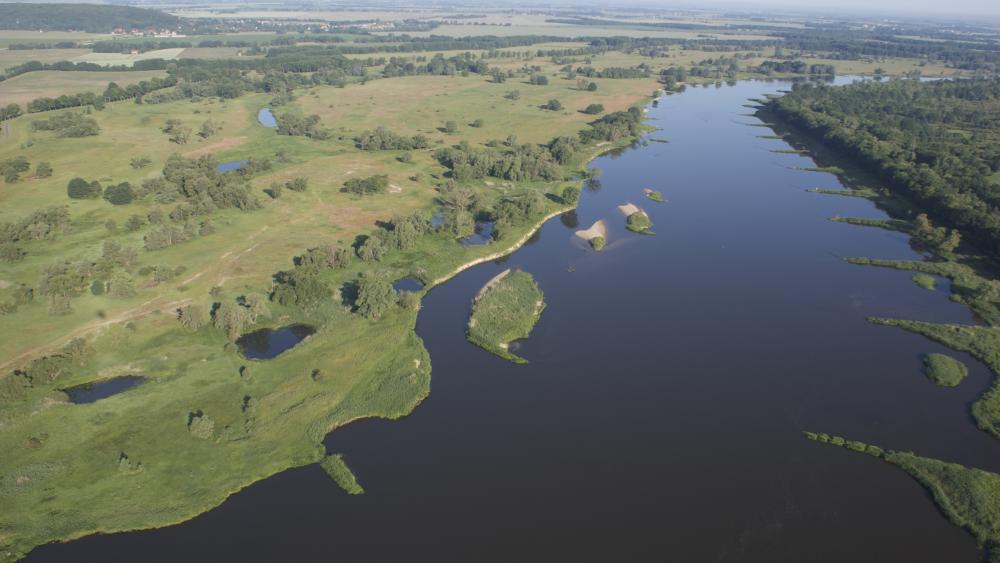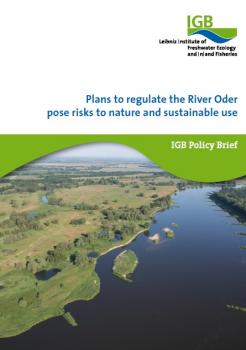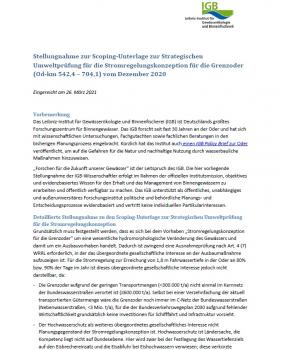
River Oder near Reitwein. I Photo: Harald Schulz
The River Oder is one of the last large relatively near-natural rivers in Europe. Over a stretch of around 500 kilometres (from near Wrocław to Świnoujście), the river flows freely, flanked by species-rich alluvial floodplains that are still intact in many places, until it reaches the sea. From the mouth of the River Neisse near Ratzdorf to the branch of the West Oder north of Schwedt, the national border lies in the middle of the river. As such, the River Oder is the last major river in Germany where fish and other animals can still migrate freely. These near-natural conditions exists because the River Oder has been of little importance for shipping for more than 100 years, implying that comparatively little investment has been made in the river’s development and maintenance. To this day, the river and its adjacent floodplains provide important habitat and refuge for many rare and endangered animal and plant species. Numerous areas are designated as protected areas (e.g. Natura 2000, national park, regional protected areas). And yet the government of the Republic of Poland is now planning to develop the River Oder, funded primarily by the World Bank, the EU, and the Council of Europe Development Bank. Germany has also actually committed to the development in a bilateral agreement. While details of the Polish plans are already available, Germany’s specific implementation plans and timelines have not yet been made public.
Violation of EU law: Planned measures destroy habitats of numerous protected species
“However, it is already clear that the anticipated objectives cannot be achieved, and that the measures will irreversibly destroy valuable habitats on both sides of the river. Poland’s plans ignore the aquatic ecological and hydrological knowledge on the Oder River basin, acquired over decades”, criticises IGB scientist Dr. Christian Wolter, co-author of the IGB Policy Brief. Moreover, according to the IGB experts, the plans violate European environmental law in several respects, in particular the EC Water Framework Directive (WFD, 2000/60/EC), the Habitats Directive (HD, 92/43/EEC) and the EC Birds Directive (2009/147/EC). “These violations will also occur through measures on the German side”, Christian Wolter assesses the situation. At the same time, the future of agriculture in the German and Polish Oder valley is in grave danger because the planned construction measures will further lower the groundwater table.
Political action necessary: Arguments put forward in favour of the development cannot be substantiated; planned measures increase flood and drought risk
“None of the arguments put forward in favour of the development – the measures would seek to improve flood protection and to promote the economic development of inland navigation – is robust. The costs are disproportionate to the benefit, and the environmental damage would be irreversible. An overriding public interest, which would be a basic legal requirement for an exception under the European Water Framework Directive for the development, cannot be credibly demonstrated”, judges IGB scientist Dr. Jörn Gessner, also co-author of the IGB Policy Brief.
According to the researchers, the planned measures even have an opposite effect: the planned concentration of the main river discharge in a narrower bed increases the risk of damage from floods due to more rapid and steep flood wakes as well as of droughts due to increased erosion and sinking groundwater tables in both countries. In the overall assessment, the scientists recommend instead the preservation and expansion of floodplain retention areas on the River Oder in order to reconcile nature conservation and sustainable use of the river and floodplain. In conclusion, the IGB researchers urgently recommend that the European Commission, the Federal Government and the Brandenburg State Government take diplomatic and legal action against the Polish development project; stop the plans on the German side; and argue for the protection of the River Oder as an ecological focus area at all levels of government.
The IGB Policy Brief can be downloaded here free of charge.




